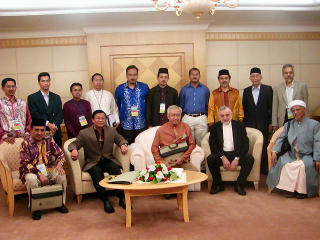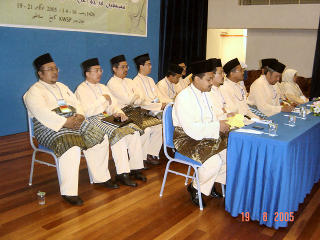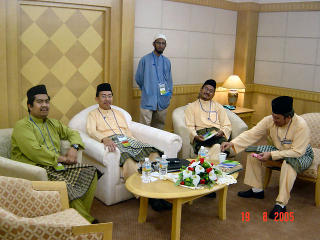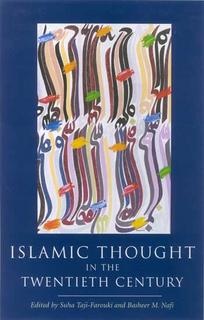


Weblog dwibahasa MERDEKA diwujudkan untuk mengetengahkan pandangan, penjelasan dan pemikiran mengenai aspek-aspek penting dalam kehidupan sama ada dari sudut peribadi, keagamaan, kemasyarakatan, kenegaraan dan keantarabangsaan. Ia dilandaskan kepada prinsip dialog secara beradab untuk mencari kebenaran dan dengan kebenaran itu keadilan dapat dibina.
"I don't think he should be banned. He has opposed all acts of terrorism by Al-Qaeda around the world. He urged Arabs to donate blood after September 11," added Livingstone, a member of Prime Minister Tony Blair's Labour Party. British Home Secretary Charles Clarke unveiled Wednesday the guidelines of "unacceptable behavior" under which the government can deport and ban Muslim scholars accused of fomenting, justifying and glorifying acts of terror and violence. The banned views include those conveyed through written or published material, including Web sites, as well as public speaking.
The new guidelines are part of the anti-terror measures taken in the wake of the July 7 London attacks, which were carried out by four bombers, including three British-born Muslims. Qaradawi, head of the Dublin-based International Association of Muslim Scholars (IAMS), swiftly condemn the grisly London attacks as running counter to the tents of Islam.
Palestinian Struggle
Livingstone warned the governments against exploiting the new guidelines against the likes of Qaradawi who support the Palestinians' legitimate resistance against the Israeli occupation of their land. "…there will be very few Muslim scholars or leaders that will ever be admitted to Britain because the vast majority of Muslims identify with the struggle of the Palestinian people". The mayor of London went on: "I see real parallels between what happens in Israel-Palestine today with the bombing campaign run by the ANC (African National Congress) against the white apartheid regime 20 years ago in South Africa."
He was referring to former South African president Nelson Mandela who was imprisoned for many years after leading an armed struggle against the apartheid racist regime in his country. "Would the supporters of Nelson Mandela have been thrown out of this country because they were supporting the bombing campaign against the apartheid racist regime in South Africa?" Livingstone asked. "If so, the list should not be approved," he said on BBC television. In March, Livingstone wrote a piece in The Guardian accusing Israeli Premier Ariel Sharon of being "a war criminal who should be in prison, not in office."
Qaradawi, also a trustee of the Oxford University Center for Islamic Studies, repeatedly drew the line between the Israeli occupation and Jews. "We do not fight Israelis because they are Jews, but because they took our land, killed our children and profaned our holy places," the venerable scholar had said. Livingstone apologized in July last year to Qaradawi "on behalf of the people of London" for the media fuss that overshadowed his last visit to Britain.
He had further called on British media to apologize to the leading scholar over their hostile campaign that sought to blemish his reputation. Livingstone had criticized the Washington-based Middle East Media Research Institute (MEMRI), which is led by a former Israeli intelligence officer, for fueling the hatred campaign.
Too Vague
Meanwhile, the government's new terror guidelines drew rebuke from leading British dailies. The Independent said the measures are "misguided" and will not help combat home-grown terrorism. "Yesterday's list was drawn up after two weeks of consultation. But the 'offences' presented are still dangerously vague. The concept of 'justifying' terrorism is too loose," said the daily. The Financial Times also dismissed some of the new measures as "vague and more alarming".
It stressed that Clarke's announcement that he is to consult on the creation of new powers to close places of worship used to foment extremism "should also be greeted with disquiet." "Closing down mosques is likely to alienate the very Muslim communities whose co-operation is desperately needed, while also impinging on religious freedom", said the paper.
Kata Mahfuz lagi, ini adalah satu keadaan yang cukup membimbangkan, walaupun tahap takungan air di Empangan Pedu masih tinggi, tetapi tahap takungan air yang bakal disalurkan ke empangan terlalu rendah,sehubungan itu beliau mengutarakan beberapa persoalan.
